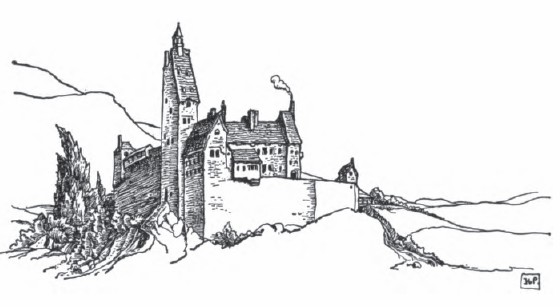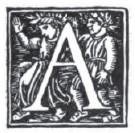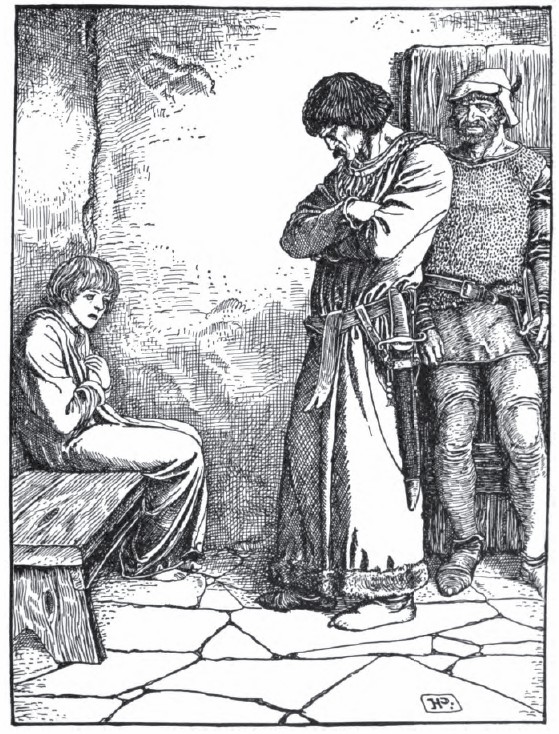| Web
and Book design,
Copyright, Kellscraft Studio 1999-2011 (Return to Web Text-ures) |
 (HOME)
|
 VIII. In the House of the Dragon Scorner.  TALL,
narrow, gloomy room; no furniture but a rude bench; a bare stone
floor, cold stone walls and a gloomy ceiling of arched stone over
head; a long, narrow slit of a window high above in the wall, through
the iron bars of which Otto could see a small patch of blue sky and
now and then a darting swallow, for an instant seen, the next instant
gone. Such was the little baron's prison in Trutz-Drachen. Fastened
to a bolt and hanging against the walls, hung a pair of heavy chains
with gaping fetters at the ends. They were thick with rust, and the
red stain of the rust streaked the wall below where they hung like a
smear of blood. Little Otto shuddered as he looked at them; can those
be meant for me, he thought.
Nothing was to be seen but that one patch of blue sky far up in the wall. No sound from without was to be heard in that gloomy cell of stone, for the window pierced the outer wall, and the earth and its noises lay far below. Suddenly a door crashed without, and the footsteps of men were heard coming along the corridor. They stopped in front of Otto's cell; he heard the jingle of keys, and then a loud rattle of one thrust into the lock of the heavy oaken door. The rusty bolt was shot back with a screech, the door opened, and there stood Baron Henry, no longer in his armor, but clad in a long black robe that reached nearly to his feet, a broad leather belt was girdled about his waist, and from it dangled a short, heavy hunting sword. Another man was with the Baron, a heavy-faced fellow clad in a leathern jerkin over which was drawn a short coat of linked mail. The two stood for a moment looking into the room, and Otto, his pale face glimmering in the gloom, sat upon the edge of the heavy wooden bench or bed, looking back at them out of his great blue eyes. Then the two entered and closed the door behind them.
 "Then dost thou not know why I am here?" said the Baron "Dost thou know why thou art here?" said the Baron, in his deep, harsh voice. "Nay," said Otto, "I know not." "So?" said the Baron. "Then I will tell thee. Three years ago the good Baron Frederick, my uncle, kneeled in the dust and besought mercy at thy father's hands; the mercy he received was the coward blow that slew him. Thou knowest the story?" "Aye," said Otto, tremblingly, "I know it." "Then dost thou not know why I am here?" said the Baron. "Nay, dear Lord Baron, I know not," said poor little Otto, and began to weep. The Baron stood for a moment or two looking gloomily upon him, as the little boy sat there with the tears running down his white face. "I will tell thee," said he, at last; "I swore an oath that the red cock should crow on Drachenhausen, and I have given it to the flames. I swore an oath that no Vuelph that ever left my hands should be able to strike such a blow as thy father gave to Baron Frederick, and now I will fulfil that too. Catch the boy, Casper, and hold him." As the man in the mail shirt stepped toward little Otto, the boy leaped up from where he sat and caught the Baron about the knees. "Oh! dear Lord Baron," he cried, "do not harm me; I am only a little child, I have never done harm to thee; do not harm me." "Take him away," said the Baron, harshly. The fellow stooped, and loosening Otto's hold, in spite of his struggles and cries, carried him to the bench, against which he held him, whilst the Baron stood above him. Baron Henry and the other came forth from the cell, carefully closing the wooden door behind them. At the end of the corridor the Baron turned, "Let the leech be sent to the boy," said he. And then he turned and walked away. Otto lay upon the hard couch in his cell, covered with a shaggy bear skin. His face was paler and thinner than ever, and dark rings encircled his blue eyes. He was looking toward the door, for there was a noise of someone fumbling with the lock without. Since that dreadful day when Baron Henry had come to his cell, only two souls had visited Otto. One was the fellow who had come with the Baron that time; his name, Otto found, was Casper. He brought the boy his rude meals of bread and meat and water. The other visitor was the leech or doctor, a thin, weasand little man, with a kindly, wrinkled face and a gossiping tongue, who, besides binding wounds, bleeding, and leeching, and administering his simple remedies to those who were taken sick in the castle, acted as the Baron's barber. The Baron had left the key in the lock of the door, so that these two might enter when they chose, but Otto knew that it was neither the one nor the other whom he now heard at the door, working uncertainly with the key, striving to turn it in the rusty, cumbersome lock. At last the bolts grated back, there was a pause, and then the door opened a little way, and Otto thought that he could see someone peeping in from without. By and by the door opened further, there was another pause, and then a slender, elfish-looking little girl, with straight black hair and shining black eyes, crept noiselessly into the room. She stood close by the door with her finger in her mouth, staring at the boy where he lay upon his couch, and Otto upon his part lay, full of wonder, gazing back upon the little elfin creature. She, seeing that he made no sign or motion, stepped a little nearer, and then, after a moment's pause, a little nearer still, until, at last, she stood within a few feet of where he lay. "Art thou the Baron Otto?" said she. "Yes," answered Otto. "Prut!" said she, "and is that so! Why, I thought that thou wert a great tall fellow at least, and here thou art a little boy no older than Carl Max, the gooseherd." Then, after a little pause — "My name is Pauline, and my father is the Baron. I heard him tell my mother all about thee, and so I wanted to come here and see thee myself. Art thou sick?" "Yes," said Otto, "I am sick." "And did my father hurt thee?" "Aye," said Otto, and his eyes filled with tears, until one sparkling drop trickled slowly down his white face. Little Pauline stood looking seriously at him for a while. "I am sorry for thee, Otto," said she, at last. And then, at her childish pity, he began crying in earnest. This was only the first visit of many from the little maid, for after that she often came to Otto's prison, who began to look for her coming from day to day as the one bright spot in the darkness and the gloom. Sitting upon the edge of his bed and gazing into his face with wide open eyes, she would listen to him by the hour, as he told her of his life in that far away monastery home; of poor, simple brother John's wonderful visions, of the good Abbot's books with their beautiful pictures, and of all the monkish tales and stories of knights and dragons and heroes and emperors of ancient Rome, which brother Emmanuel had taught him to read in the crabbed monkish Latin in which they were written. One day the little maid sat for a long while silent after he had ended speaking. At last she drew a deep breath. "And are all these things that thou tellest me about the priests in their castle really true?" said she. "Yes," said Otto, "all are true." "And do they never go out to fight other priests?" "No," said Otto, "they know nothing of fighting." "So!" said she. And then fell silent in the thought of the wonder of it all, and that there should be men in the world that knew nothing of violence and bloodshed; for in all the eight years of her life she had scarcely been outside of the walls of Castle Trutz-Drachen. At another time it was of Otto's mother that they were speaking. "And didst thou never see her, Otto?" said the little girl. "Aye," said Otto, "I see her sometimes in my dreams, and her face always shines so bright that I know she is an angel; for brother John has often seen the dear angels, and he tells me that their faces always shine in that way. I saw her the night thy father hurt me so, for I could not sleep and my head felt as though it would break asunder. Then she came and leaned over me and kissed my forehead, and after that I fell asleep." "But where did she come from, Otto?" said the little girl. "From paradise, I think," said Otto, with that patient seriousness that he had caught from the monks, and that sat so quaintly upon him. "So!" said little Pauline; and then, after a pause, "That is why thy mother kissed thee when thy head ached — because she is an angel. When I was sick my mother bade Gretchen carry me to a far part of the house, because I cried and so troubled her. Did thy mother ever strike thee, Otto?" "Nay'" said Otto. "Mine hath often struck me," said Pauline. One day little Pauline came bustling into Otto's cell, her head full of the news which she carried. "My father says that thy father is out in the woods somewhere yonder, back of the castle, for Fritz, the swineherd, told my father that last night he had seen a fire in the woods, and that he had crept up to it without anyone knowing. There he had seen the Baron Conrad and six of his men, and that they were eating one of the swine that they had killed and roasted. "Maybe," said she, seating herself upon the edge of Otto's couch; "maybe my father will kill thy father, and they will bring him here and let him lie upon a black bed with bright candles burning around him, as they did my uncle Frederick when he was killed." "God forbid!" said Otto, and then lay for a while with his hands clasped. "Dost thou love me, Pauline?" said he, after a while. "Yes," said Pauline, "for thou art a good child, though my father says that thy wits are cracked." "Mayhap they are," said Otto, simply, "for I have often been told so before. But thou wouldst not see me die, Pauline; wouldst thou?" "Nay," said Pauline, "I would not see thee die, for then thou couldst tell me no more stories; for they told me that uncle Frederick could not speak because he was dead." "Then listen, Pauline," said Otto; "if I go not away from here I shall surely die. Every day I grow more sick and the leech cannot cure me." Here he broke down and, turning his face upon the couch, began crying, while little Pauline sat looking seriously at him. "Why dost thou cry, Otto?" said she, after a while. "Because," said he, "I am so sick, and I want my father to come and take me away from here." "But why dost thou want to go away?" said Pauline. "If thy father takes thee away, thou canst not tell me any more stories." "Yes, I can," said Otto, "for when I grow to be a man I will come again and marry thee, and when thou art my wife I can tell thee all the stories that I know. Dear Pauline, canst thou not tell my father where I am, that he may come here and take me away before I die?" "Mayhap I could do so," said Pauline, after a little while, "for sometimes I go with Casper Max to see his mother, who nursed me when I was a baby. She is the wife of Fritz, the swineherd, and she will make him tell thy father; for she will do whatever I ask of her, and Fritz will do whatever she bids him do." "And for my sake, wilt thou tell him, Pauline?" said Otto. "But see, Otto," said the little girl, "if I tell him, wilt thou promise to come indeed and marry me when thou art grown a man?" "Yes," said Otto, very seriously, "I will promise." "Then I will tell thy father where thou art," said she. "But thou wilt do it without the Baron Henry knowing, wilt thou not, Pauline?" "Yes," said she, "for if my father and my mother knew that I did such a thing, they would strike me, mayhap send me to my bed alone in the dark." |